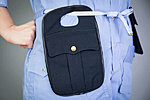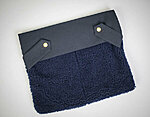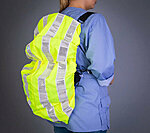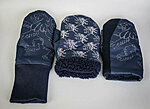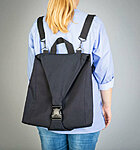New products made from Estonian defence industry waste
EKA's Sustainable Design and Materials Lab DiMa, Tallinn University (TLÜ) and the Estonian Defence Industry Association (EKTL) worked together on a year-long project to map the amount of production waste in the Estonian defence industry and ways of dealing with it, and to test sustainable design methods. With a focus on value-added recycling, solutions were sought to move from production waste to the circular economy and to introduce quality management. Twelve other partners were involved in the project, including the Rescue Service, the Police and Border Guard, Sangar AS, YKK Finland, etc.
The initiative investigated the quantities and types of waste generated by the defence industry's project partners during the manufacturing process and the subsequent storage/retrieval of equipment, and for some institutions the numbers were noteworthy. For example, the Estonian Defence Forces generate 30-40 tonnes of waste per year.
The project proposed more than ten options for waste recovery, this time focusing primarily on the textile industry.
In the spring semester of 2018, mixed groups of EAA and TUT students were formed and together they worked on mapping the management of production residues and further product development.
The initiative investigated the quantities and types of waste generated by the defence industry's project partners during the manufacturing process and the subsequent storage/retrieval of equipment, and for some institutions the numbers were noteworthy. For example, the Estonian Defence Forces generate 30-40 tonnes of waste per year.
The project proposed more than ten options for waste recovery, this time focusing primarily on the textile industry.
In the spring semester of 2018, mixed groups of EAA and TUT students were formed and together they worked on mapping the management of production residues and further product development.
Eliize Hiiop, a student at the Sustainable Design and Materials Lab at EKA, explained the prototype made during the project, "Almost all of us have experienced the discomfort of wearing a seatbelt. For a small child, the situation is even more disturbing. Often, a child falls asleep in the car, but the seatbelt is uncomfortable and there is no place to support the head. There is now a solution to this worry - the Safety Swing! The Safety Cushion is born from the leftovers of the textile industry, making car journeys more comfortable by saving the environment. It protects the seatbelt from the sharp edge of the groove and supports the baby's head for a sweet sleep. Behind the name of the booster cushion are different characters that help to turn a tedious car ride into a refreshing nap or a fun romp, as the child needs it."
Environmentally sustainable bike bags for both adults and children were also further developed, with a final price that should be half the price of products currently on the market.
Students: EKA Sustainable Design and Materials Lab students and Tallinn University Environmental governance students
Project managers: Reet Aus (EKA), Liisa Puusepp (TLÜ), Mihkel Kangur (TLÜ), Helen Sooväli Sepping (TLÜ), Margus Vetsa (TLÜ)
Environmentally sustainable bike bags for both adults and children were also further developed, with a final price that should be half the price of products currently on the market.
Students: EKA Sustainable Design and Materials Lab students and Tallinn University Environmental governance students
Project managers: Reet Aus (EKA), Liisa Puusepp (TLÜ), Mihkel Kangur (TLÜ), Helen Sooväli Sepping (TLÜ), Margus Vetsa (TLÜ)



